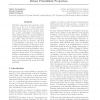Free Online Productivity Tools
i2Speak
i2Symbol
i2OCR
iTex2Img
iWeb2Print
iWeb2Shot
i2Type
iPdf2Split
iPdf2Merge
i2Bopomofo
i2Arabic
i2Style
i2Image
i2PDF
iLatex2Rtf
Sci2ools
103
Voted
ICML
2006
IEEE
2006
IEEE
Robust probabilistic projections
Principal components and canonical correlations are at the root of many exploratory data mining techniques and provide standard pre-processing tools in machine learning. Lately, probabilistic reformulations of these methods have been proposed (Roweis, 1998; Tipping & Bishop, 1999b; Bach & Jordan, 2005). They are based on a Gaussian density model and are therefore, like their non-probabilistic counterpart, very sensitive to atypical observations. In this paper, we introduce robust probabilistic principal component analysis and robust probabilistic canonical correlation analysis. Both are based on a Student-t density model. The resulting probabilistic reformulations are more suitable in practice as they handle outliers in a natural way. We compute maximum likelihood estimates of the parameters by means of the EM algorithm.
ICML 2006 | Machine Learning | Probabilistic Canonical Correlation | Probabilistic Principal Component | Probabilistic Reformulations |
Related Content
| Added | 17 Nov 2009 |
| Updated | 17 Nov 2009 |
| Type | Conference |
| Year | 2006 |
| Where | ICML |
| Authors | Cédric Archambeau, Michel Verleysen, Nicolas Delannay |
Comments (0)

